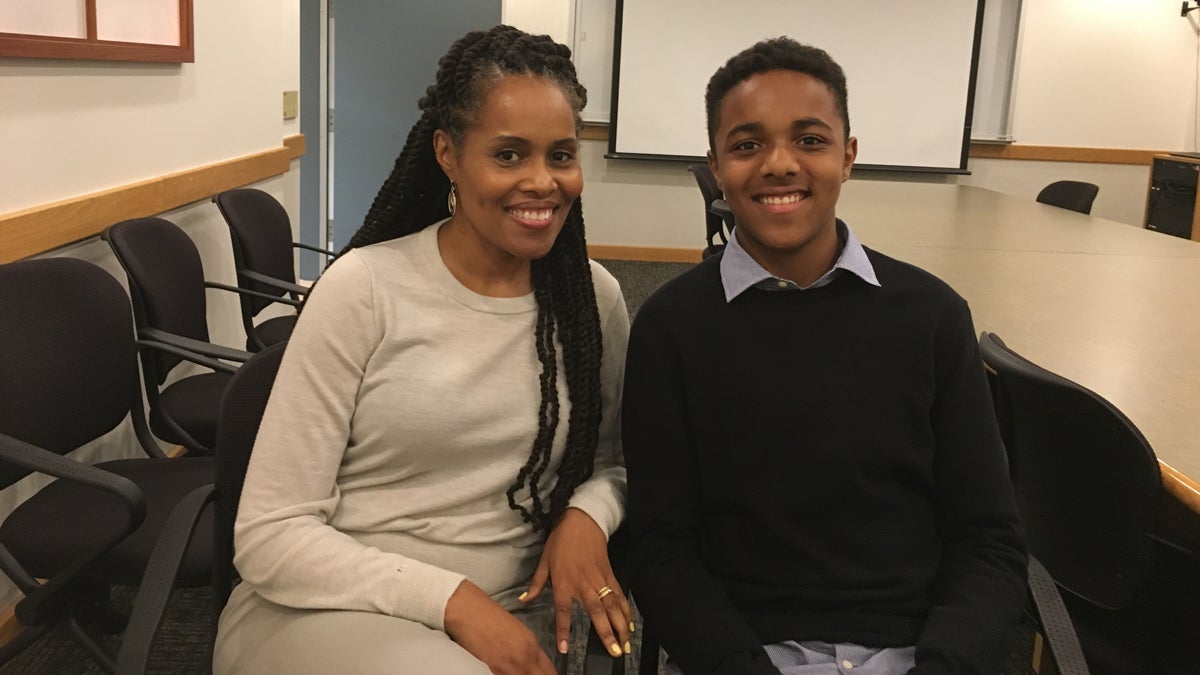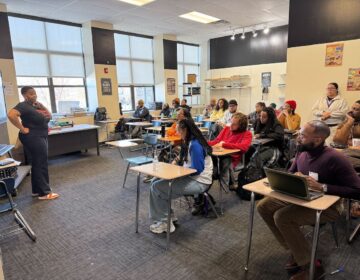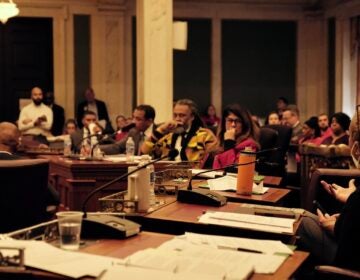Embracing new approach, African-American families help kids deal with racism
Listen
Barbara and Peirce Ellis recently took part in the five-week Engaging, Managing and Bonding through Race program in Philadelphia. (Anne Hoffman/ for NewsWorks)
Among the difficult discussions parents have with their children, talking about racism and inequality in one of the toughest.
A Philadelphia program is acting as a resource to help African-American families have honest conversations about those issues — and help them improve coping skills.
When Barbara Ellis was younger, growing up in small town West Texas, she remembers dancing with a white friend.
“And some of his friends were saying horrible things to him for dancing with me,” she recalled. “And he kept that from me, I don’t think he told me for like a year later.”
But when she did find out, it was hard for her family and friends to have a larger conversation about the painful experience.
“Those weren’t conversations that we had. It was just, ‘That person is awful,’ and forget about it,” said Ellis who now lives in Delaware County.
Ellis has just finished the EMBRace program with her 13-year-old son, Peirce.
Formally known as Engaging, Managing and Bonding through Race, the five-week program — with an additional week at the beginning and the end for intake and evaluation — includes individual and family therapy. The program unpacks common responses to racism and gives families different coping tools.
Kids who are not prepared often bottle up frustration and anger, said Riana Anderson, developer and director of the program.
“You’re going to internalize quite a bit, and think about all the things you did wrong … what it is about me as a person? … rather than this is what this person sees about a whole group of people,” she said.
Part of helping kids process racist acts or prepare for them is an exercise families do in sessions — formulating comebacks.
“The racial comebacks are a way of saying “I know you are, but what am I?”‘ said Anderson.
But before program participants come up with the comeback they might really use, they get a chance to say the first thing that would come to their mind. After that unfiltered reaction, they have an opportunity to think about what actually would work well for them in that situation, a response that’s usually more tempered and assertive.
Anderson illustrated the prescription with a comeback of her own.
For instance, what if if someone said to her there’s no need to talk about race because we live in a post-racial society?
“So the comeback to that is, ‘Oh, when were we racial?’ And just ending it there, because people will ask you, ‘Haven’t we already dealt with this?’
“And they’ll try to put it on you. So I just like to say, ‘When is it that we did do this? Can you tell me?'” she said.
Turning a situation around
During the classes, Peirce thought about a recent painful situation. While he waited for his mom to pick him up from orchestra practice one night, he saw a man on the street with a companion.
“And he pulled his wife or fiancee closer, he was like, ‘Let’s hurry up, I don’t want to get robbed.’ And he was looking right at me, and I was the only person there,” Perice said. “So I felt like that was directed toward me.”
Barbara Ellis said her first instinct as a parent would be to go into advocacy mode or parrot the responses she used to hear as a kid.
“What I would have said is, ‘Oh, don’t listen to him.’ Which erases [her son’s] emotions in that moment,” she said.
Through the program, Ellis discovered that sort of a response made Peirce feel like she didn’t totally see him.
She’s shifted her reaction to a more curious, “How do you feel?” and “What would you like to do about it?”
Peirce said he’s noticed the change. So, he thought about the fact that, in reality, he had cause to be afraid because he was carrying an expensive viola on his back.
Thinking up that comeback — with the knowledge that his mother supports his emotional reaction — Peirce said, “I think it makes me feel more supported in what I’m doing. Like getting reassurance that I didn’t do anything wrong.”
The hardest week of the program for Ellis was when the discussion touched on police killings of unarmed black men and the kinds of conversations she’ll need to have with her sons.
“Just to even have to have that conversation with my 13-year-old is hard,” she said. “When I think about it, it makes me want to cry.”
“I’ve heard it said, and I think it’s kind of common within black families, ‘Just do what you need to do to come home,” she said of her previous reaction.
But EMBRace helped her shift from that orientation, to exercises where kids can actually talk through these possibilities with their families and what they could reasonably do. They talk about how to stand up for oneself and how to become more empowered.
“I think that’s more hopeful than conversations that are shrouded in a level of fear,” Ellis said.
Anderson agreed.
So many things are beyond someone’s control and no one can really know if a situation is fully safe, she said. But she said her program can help families assert their voices. And that, in itself, is powerful.
WHYY is your source for fact-based, in-depth journalism and information. As a nonprofit organization, we rely on financial support from readers like you. Please give today.




